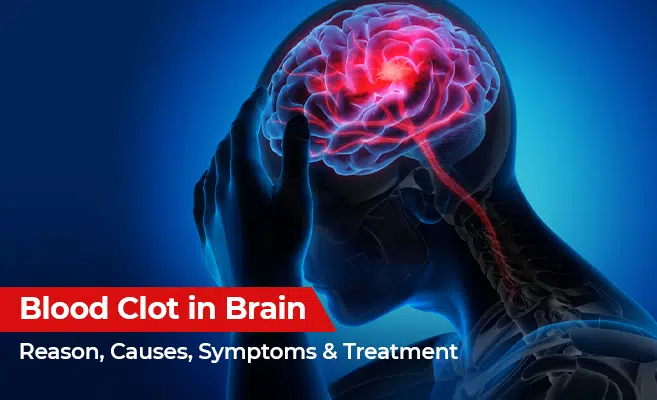Blood Clot in Brain: Reason, Causes, Symptoms & Treatment

A blood clot in or around the brain can be lethal if not addressed on time. Normal clotting of blood in the event of a cut or wound prevents a person from bleeding to death. However, when clots form in the brain, they stop blood from travelling to the organ, thereby cutting off the brain’s oxygen supply.
This leads to multiple complications, including paralysis, stroke, and sometimes inevitable death. Blood clots in the brain are a severe condition that can become fatal in a matter of minutes. Let us examine the reasons for blood clot in the brain, the symptoms, and the solutions in detail.
Why Do Blood Clots Form in the Brain?
A blood clot in the brain is as serious as it gets. This life-threatening illness, also known as thrombosis, can form at any time, anywhere, at any age. Of course, some factors put certain types of people at more risk for a clot in the brain than others. However, that doesn’t mean a brain clot is inevitable.
Far from it, there are many reasons for blood clot in the brain. From external head injuries or trauma to inflammation, artery resizing, and more, blood clots mostly happen without any warning. However, there are some telling signs you can watch out for if you pay close attention.
Here are a few causes for blood clots to make their way into the brain.
Factors that Put You at Risk for Forming Blood Clots in the Brain
Doctors have found multiple causes that lead to a blood clot forming in or travelling up to the brain and causing havoc. Of course, there are some cases where even the most advanced field of medicine fails to spot the cause behind a specific clot formation. For now, let us examine how a blood clot can find itself in the brain –
Trauma
Head trauma is one of the most common reasons for blood clot in the brain. If there is any exterior stimulus that creates a violent impact on the head, a clot is all too common. Falling, or hitting the head are actions that cause blood clots to form in the brain. It is a natural effect designed to prevent you from bleeding out. However, the clots also constrict the blood from circulating through the brain, causing contractions and complications, often leading to strokes or even death.
Mobile Clot
An embolus is a clot that travels from an injured part of the body to the brain, passing through the blood-brain barrier. Emboli are blood clots that move through the bloodstream, usually through arteries but sometimes through the vein. They can lodge in the brain and create problems.
Artery Resizing
Inflamed arteries and narrowing or broadening of arteries are also leading causes of clot formation in the brain.
Other Factors
There are multiple other factors as well that are the leading reasons for blood clot in the brain, like obesity, neonatal intricacies, dialysis, shock, and dysrhythmias. The list is vast, so you can ask your health provider for a more expansive look into blood clot in brain causes.
Symptoms of Blood Clots in the Brain
There are many blood clot in brain symptoms that manifest for attention –
- Intense and recurring headaches
- Sudden impediments like slowing or slurring in speech
- Blurry eyesight
- Uncontrollable motor functions
- Seizures
- Change in personality
- Dizziness
- Paralysis (partial or full-bodied).
How to Treat Blood Clots in the Brain
While it sounds tricky, treating blood clots should not be difficult if caught in the early stages. You can take a look at the following steps to see some types of blood clot in brain treatment –
- Seek immediate medical attention if you receive any injury to the head. Do not delay your visit especially if you have blood clot in brain symptoms.
- Surgery is an option for high-risk clots.
- Hospitals can use catheters or retrieval mechanisms to locate and recover the clots.
- The drug tissue plasminogen activator (TPA) also helps to break up any clots that may form in the brain.
- Ischemia and reperfusion treatments can help remove clots and reduce post-treatment complications substantially.
- Exercise regularly, but do not strain yourself. Move around to avoid clots forming in your legs and travelling up to your brain.
- If there is a history of blood clots in your family, schedule regular checkups with your healthcare provider.
- If your doctor thinks it is necessary for your overall health, you can ask them to prescribe you blood thinners (anticoagulants).
Conclusion
As you can understand, blood clots in the brain are a grave matter. You can find the most modern and safe approaches to blood clots treatment at PSRI. PSRI is a leading, multispecialty hospital in northern India and strives for excellence in the treatment of blood clots and other diseases. You can find more information about the hospital by visiting the site.

 Book An Appointment
Book An Appointment Virtual Consultation
Virtual Consultation




